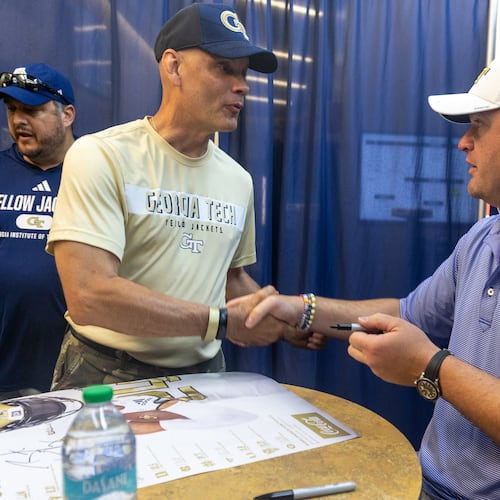For health insurance for her children, Demetria Fiffie drove a 2,500-gallon fuel truck in a war zone. For love of country and her son Tariq Carpenter and daughter Alexis Chatmon, Fiffie deployed overseas five times with the U.S. Army, engagements that normally lasted a year.
For her children, it meant a life of change, moving from one home to another, to say nothing of limited connection with their mother.
“Imagine talking to your mom once a day for a whole year,” said Carpenter, Georgia Tech’s stalwart safety.
In 2014, Fiffie retired as a staff sergeant after 13 years in the military, although she said she continues to bear the invisible scars of post-traumatic stress disorder. However, her son is a semester away from earning his bachelor’s degree in literature, media and communication from Tech and harbors dreams of an NFL career. Her daughter has a full-time job working for the state of Florida as she continues toward her own college degree in human resources at Georgia Southern.
“I would do it all over again to get them where they are now,” Fiffie told the AJC.
Credit: Danny Karnik/Georgia Tech Athletics
Credit: Danny Karnik/Georgia Tech Athletics
Carpenter, a three-year starter for the Yellow Jackets, plans to celebrate Mother’s Day by squiring his mother from their home in Ludowici in southeast Georgia to the beach, one of her favored destinations.
“She just likes to put her feet in the water,” Carpenter said.
A drive to the beach would be a trip happily made to demonstrate the love and gratitude that fill Carpenter’s heart.
“My mom is definitely my ‘why,’” Carpenter said. “She’s also my purpose. She’s my role model. She’s a person that I look up to because of those reasons because of the sacrifices that she made for me and Alexis to live a good life. I just do everything I can to make sure that she gets everything that she wants because she did the same thing for us.”
It was in February 2001 when Fiffie, a young mother of two separated from her husband, joined the Army. In the midst of an economic recession, her job as a data processing assistant in Columbia, Mo., was eliminated. While a college graduate, she was having difficulty landing a job that could support her family. Taking care of two young children by herself and going through what she called a bad time in her life, she needed something with stability. A visit to a family member at a military post got her attention.
“I was like, I’ve got to give my kids some good health insurance,” Fiffie said. “That was me. That was why I joined the military. That’s when my whole life took a turn.”
Fiffie was 28 at the time of enlistment. Alexis was 4 and Tariq was 2. As she began her training, she left them in her hometown of Little Rock, Ark., in the care of her mother, Maybell Hampton. Away from her children for the first time in her life, Fiffie called it the “loneliest thing a parent could ever do.” Her thoughts constantly returned to her children.
“But the thing about it, what kept me waking up every day is I knew I was going to have better benefits for my kids,” Fiffie said.
Fiffie just needed to make it through several months of training, and then she could begin working on an Army base and be with her children. Fate had other plans. The day that Fiffie reported for duty with the 3rd Infantry Division at Fort Stewart – not far from Ludowici – was Sept. 11, 2001, the date of the terrorist attacks on the World Trade Center and the Pentagon.
“I got in, boy, did that take a turn for the worse,” Fiffie said.
Credit: Danny Karnik
Credit: Danny Karnik
A year later, she was headed to Kuwait as the U.S. amassed troops in advance of the invasion of Iraq. Fiffie was a corporal (E-4) within the 10th Engineer Battalion. Her job was operating a 2,500-gallon fuel truck.
“I was just a bomb driving around, a truck full of fuel,” she said.
Fiffie said she was nearly killed by a missile strike. She took part in the fall of Baghdad, driving her truck in the “Thunder Runs” into the capital city. She recalled being under attacks by rocket-propelled grenade at the Camp Fallujah compound.
She returned home after a year, but her military life had only begun. In 2004, she was deployed to South Korea for one year. She served two more tours in Iraq, once for a year and the second time for a month before a medical condition brought her back home. Her last deployment was to Afghanistan in 2010, another year.
From the time of her initial deployment in 2002 until she returned from Afghanistan in 2011, Fiffie was away from her children and often in harm’s way for a total of more than four years. Meanwhile, Alexis and Tariq stayed with family members and a friend during the different deployments, meaning more disruption to their lives.
“Whenever she would go, it always felt as if I was missing part of me,” Carpenter said.
Carpenter remembered his and Alexis’ tears when she left, and how his mother swore pinkie promises to them that she would return. There was the gut punch of the first call after Fiffie arrived, the undeniable evidence that she was on the other side of the world.
“She was so far away, video-calling us in a danged tent,” Carpenter said.
When he was in middle school, Carpenter said that military appreciation days at school helped him develop more understanding for what his mother was doing. Unsurprisingly, though, Carpenter said her absences were upsetting.
“Just as I got older, it was as if she missed part of my life,” he said.
One of his favorite childhood memories was when he returned an interception for a touchdown for the first time, as a sixth grader. Though thousands of miles away, Fiffie was able to share in the moment.
“My stepdad, he said as soon as he answered the phone, I caught the pick,” Carpenter said.
Even the times when she was back home weren’t easy, as she tried to give her children her love and time, but also figure out how to enforce discipline, all the while continuing to work at her base.
“You’ve got to slowly ease yourself back into your family’s life when you come back from those deployments,” Fiffie said. “Because you can cause a lot of damage, especially when your kids start getting older.”
In 2012, when Carpenter was 13 and in middle school, Fiffie switched her duty station from Fort Hood to Fort Stewart, moving to Ludowici, one more change. In 2014, she medically retired with PTSD. Carpenter was almost 16, a sophomore at Long County High.
The trauma of war and return to civilian life were overwhelming for Fiffie. No longer around military personnel, she had trouble connecting with others. Seemingly benign activities such as driving or watching an action movie with her children gave her anxiety. She felt like she was always being watched. Leaving the house gave her feelings of paranoia.
In August 2015, Fiffie tried to commit suicide, she said. Thankfully, she survived.
“I don’t even know how I got led there, but that’s where I was,” she said.
Suicide attempts are not uncommon among veterans. In the U.S. in 2018, there were 17.6 suicides by veterans per day, according to the U.S. Department of Veteran Affairs. The rate of suicide among women veterans was 2.1 times higher than among non-veteran women.
“I don’t have a problem admitting that I’m a suicide survivor,” Fiffie said. “It’s just something that has made our family stronger.”
In her recovery, Fiffie saw her children respond with the same duty and love that she had given them.
“He was right there,” Fiffie said of her son. “Everything I needed. He would talk to me, try to console me. If I needed to talk about anything, he’d be there.”
It’s not a topic Carpenter likes to talk about.
“It was definitely something that I want to forget,” he said.
With the help of counseling, Fiffie’s condition has improved.
“I’m not there, but I’m getting there,” she said. “I’m a lot better than where I was.”
Undoubtedly, the growth and health of her children have given her a lift. At Tech, coaches rave about Carpenter’s qualities as a teammate and leader. Healthy and in better physical shape going into his final season, he hopes to lead a team and personal resurgence after last season’s 3-7 record. A close friend of his from Long County, Jamin Davis, was a first-round pick of the NFL’s Washington Football Team after earning All-SEC honors as a linebacker at Kentucky following two seasons as a backup.
“He’s kind of in that mold, too,” safeties coach Nathan Burton said of Carpenter in April. “He knows that this is his last hurrah, and he’s really doing the things that it takes to be successful.”
While he was diagnosed with ADHD, he has forged his way through Tech’s academic rigor. Carpenter has a speech impediment, but he has been a capable team representative with media, generous with compliments for teammates. Team academic adviser Brandon Pottebaum wrote in an email that each time Carpenter visits his office, he leaves with a thank you. With only a couple of classes to go before graduation – he’s looking for an internship this summer – he is nearing the summit of a 4½-year climb.
“I’m so proud of my babies, I don’t even know what to do,” Fiffie said.
On this weekend, at least, dipping her toes in the Atlantic Ocean would seem a suitable activity.
The Atlanta Journal-Constitution limits reporting on suicides and attempted suicides because of concerns that attention can increase the likelihood of suicide in vulnerable individuals. We typically limit details even when the incident occurs in a public place or involves a high-profile individual.
If you or anyone you know is contemplating suicide, call or text the 24-hour hotline at 800-273-8255. For more information, go to www.suicidepreventionlifeline.org.
About the Author
Keep Reading
The Latest
Featured






